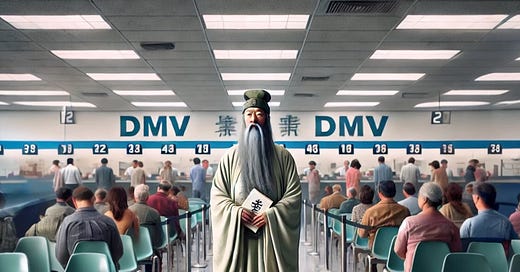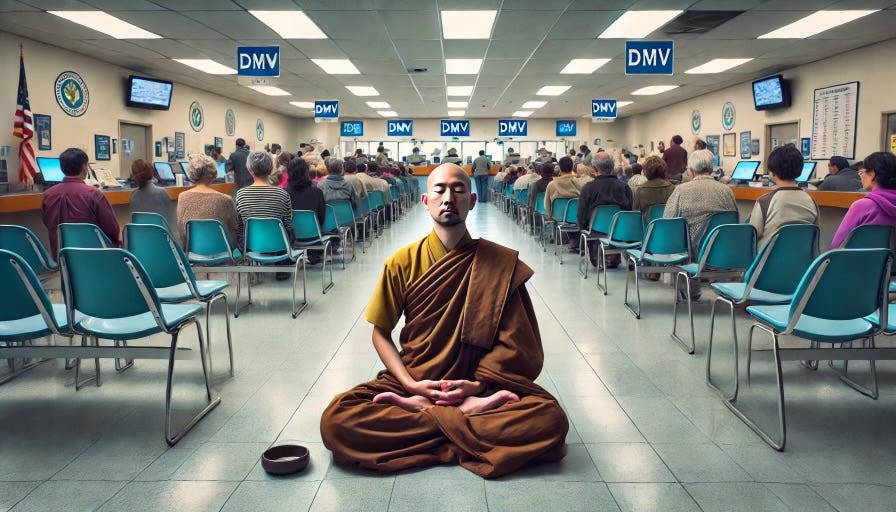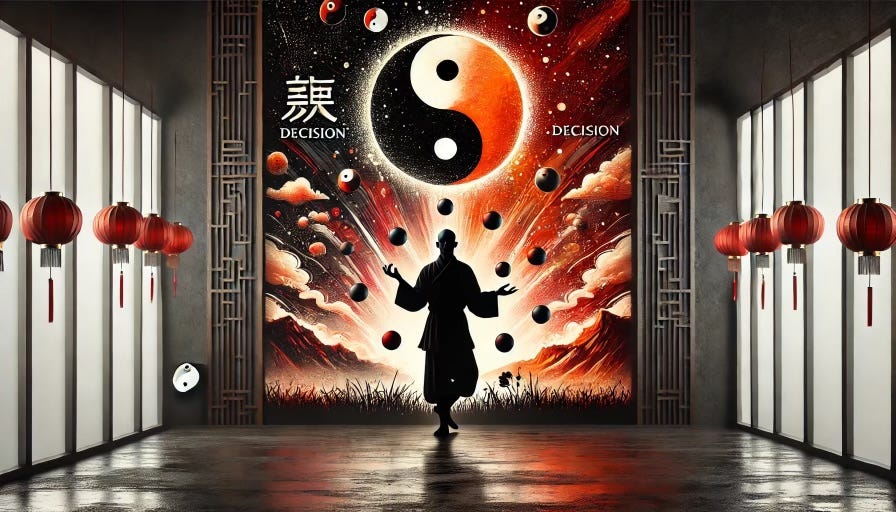Picture this — Lao Tzu, the ancient Taoist sage, strolling into a modern Department of Motor Vehicles. The master of flow, simplicity, and non-action walks into a maze of inefficiency—a scene far removed from the natural harmony he espoused in the Tao Te Ching.
Here, in the heart of bureaucratic America, he’s greeted with a line that seems eternal, glitching screens, and workers whose expressions reflect only frustration.
While writing this, I was reminded of a similar ordeal of Sisyphean proportion a few years ago. I arrived early, anticipating the worst, yet somehow, it was worse than imagined. The number I held in my hand seemed like a joke, a cruel reminder of how far away I was from getting anything done.
The flicker of the malfunctioning computers, the clock ticking with mockery, and the overall deadening atmosphere made me think — if Lao Tzu were here, what would he think of this chaotic attempt at governance?
Lao Tzu, a proto-libertarian or perhaps even an anarchist, would undoubtedly view this mess as a perfect example of what happens when the government strays too far from its natural order.
The Taoist idea of wu wei, or effortless action, stands in stark contrast to the DMV’s reality, where inefficiency reigns supreme, and every action feels cumbersome, tangled in red tape.
The employees, trapped in a system that doesn’t work for them or anyone else, become extensions of the very chaos they despise. And all of us, in line, are caught in this cycle of frustration.
In the Tao Te Ching, Lao Tzu suggests, “The more prohibitions there are, the poorer the people will be.” The more layers of bureaucracy and regulation a system piles on, the further it strays from the Tao—the natural way.
The DMV represents the very thing Lao Tzu warned against: a government too involved, too bloated with rules, and too far removed from the people it’s meant to serve.
The long lines, the glitches, and the cold faces are not just signs of inefficiency; they are symptoms of statism—an overreach of authority that crushes the spirit, wastes time, and alienates individuals from their own autonomy.
Lao Tzu would have called for less government, less control, and more trust in the natural order. Perhaps in a libertarian society modeled after his teachings, there wouldn’t be a DMV at all—or at least not one with such Kafkaesque absurdities.
Services would flow like water, adapting to needs rather than rigidly imposing rules that fit no one. People would be trusted to govern their own affairs, requiring minimal interference.
The idea that the state could manage something as complex as human life, or even the relatively simple task of issuing a driver’s license, would strike Lao Tzu as the height of arrogance.
Yet, here we are, stuck in this cycle, forced to navigate a system that functions as poorly as a clogged artery in the body politic.
But before we spiral into cynicism or rage, Lao Tzu’s teachings offer us a way through this modern frustration. If you find yourself at the DMV again, take these lines from the Tao Te Ching to heart:
“The Tao does nothing, yet leaves nothing undone.” Don’t fight the inefficiency. The more you resist, the more the system will grind you down. Embrace the chaos as part of the way things are.
“He who knows enough is enough will always have enough.” You won’t change the DMV, but you can control your response. Detach from the outcome. Allow the experience to be enough, even if it’s far from perfect.
“When the government is laid back, the people are relaxed.” This isn’t just about the DMV—it’s about how we live in a society overburdened by rules. Lao Tzu would remind us to stay relaxed, even in the face of a tense, overbearing system.
In the end, Lao Tzu’s libertarian leanings suggest that the less the state does, the more the people thrive. Yet, in the DMV, we see the opposite: a clunky machine choking under its own weight.
The next time you’re stuck in that line, think of Lao Tzu. He wouldn’t rage against the inefficiency; he’d flow with it, reminding us that the best way to resist a broken system is to stop expecting it to work.
Instead, find your own inner calm, your own personal Tao, and let the bureaucratic madness unfold around you like water around a rock.
I invite you to contact me at chocolatetaoist@proton.me for more information on my donation based virtual qigong sessions. I look forward to hearing from you.






